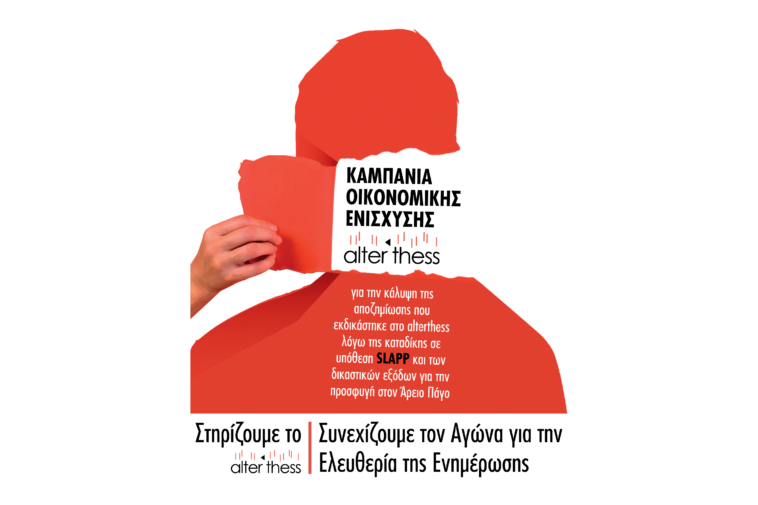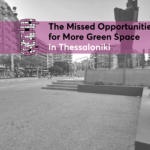We don’t have good news, neither for ourselves nor for journalism. A short while ago, we were informed of the decision by the Athens Court of Appeals, which rejected our appeal against the initial ruling in the SLAPP (Strategic Lawsuit Against Public Participation) case brought against us in October 2021 (targeting journalist Stavroula Poulimeni and Alterthess) by Efstathios Lialios, a senior executive at Hellas Gold.
The initial ruling partially upheld the SLAPP lawsuit filed by Hellas Gold’s executive, Efstathios Lialios, regarding a news report published by the journalist Ms. Poulimeni in Alterthess in October 2020, which covered the first-instance criminal conviction of two company executives (read more about the case here). The court’s ruling and the names involved were publicly announced in open session at the Polygyros Misdemeanor Court, where the journalist was present in person.
That first ruling stated, among other things, that Stavroula Poulimeni had unlawfully processed personal data by including the plaintiff’s conviction in her report without his explicit consent. The court found that the publication of this information was not necessary for informing the public, asserting that this could have been achieved without disclosing his name and professional position. As a result, the court awarded €3,000 in damages to be paid by Alterthess and Stavroula Poulimeni for the supposed moral harm suffered by the plaintiff (who in the initial lawsuit had asked for €100,000 as restitution).
Our appeal was heard on September 19, 2024, at the Athens Court of Appeals, in the presence of numerous unions, press associations from Greece and abroad, organizations defending freedom of expression, grassroots movements, and our readers, all standing in solidarity with us. The collective opinion was that the initial ruling was a blow to freedom of the press and to our ability to hold those in power and major financial interests to account.
The Court of Appeals’ decision deals an even heavier blow to freedom of the press. It sets a dangerous precedent for journalists investigating corporate wrongdoing and holding public figures and economic power players accountable.
This is especially troubling because, even though the court acknowledges “the strong public interest among residents of Halkidiki and Thessaloniki in the mining activities of Hellas Gold and the resulting pollution, environmental degradation, and possible contamination of local water supplies in Stratoni, Neochori, and Olympiada,” it still deemed the publication of the plaintiff’s name and professional role as unnecessary for informing the public. Even worse, contrary to European Court of Human Rights precedent, the Appeals Court concluded that the plaintiff was not a public figure.
In our view, the mere existence of such a decision in our country’s legal precedent represents the effective death of journalism. If the legal representative of a company, who bears criminal responsibility for the company’s activities, isn’t considered a public figure, then who is? Are only celebrities or those who seek publicity considered public figures? The ruling against us is fundamentally flawed for many reasons: if we can’t name individuals who have been convicted in a public trial over a matter of clear public interest, then what exactly can we report on? How are we expected to do our job as journalists? Are we to stick to vague generalities, saying someone, somewhere, once did something? What kind of journalism would that be, and what role could it possibly serve in society, if it provides no meaningful, specific information, and merely sows confusion about accountability, people, and facts?
At a time when corporations, through legal means like advertising, advertorials, sponsorships, and their financial clout, are creating a wall of silence around their activities, they have every incentive to strip personal accountability from their executives, especially when they are implicated in wrongdoing, while simultaneously promoting other powerful individuals (CEOs, etc.) to advance their interests and their “social contributions.”
And at a time when the personal and biometric data of ordinary citizens can be freely collected and dissected, even in public spaces and without consent or notification, thanks to the recent European AI Act, this court ruling denying our appeal insists that public interest information about those responsible for public health and citizen safety must be kept hidden.
Because we believe this development affects not only Alterthess and our team but all journalists, and because the misuse of personal data laws is laying the groundwork for a wave of new SLAPP lawsuits, we are determined to take our case to the Supreme Court of Greece (Areios Pagos).
We are not alone in viewing the lawsuit brought against us as a textbook SLAPP case. According to international freedom of the press organizations and public statements by domestic press unions, the lawsuit is baseless, abusive, and intended to intimidate and silence journalists and citizens alike. We refuse to become an example used to freeze journalism and civil society into inaction. We will continue fighting for the annulment of this decision and to stop the SLAPP phenomenon, which has chilling consequences for freedom of the press and citizen participation in public life.
We call on unions, organizations, citizens, and our readers to support not only us but everyone being targeted by such tactics, and to stand up for their right to independent journalism and access to information, free from the climate of fear and censorship that is being forced upon us.
We are launching a fundraising campaign to help Alterthess cover the damages awarded to the plaintiff as well as the legal expenses required to continue our legal battle.
Thank you for your support thus far, it is invaluable and is what helps us collectively endure and stay standing



